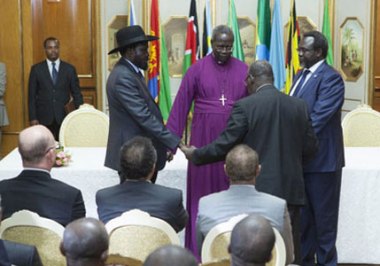S. Sudanese bishop says “bad governance” sparked conflict
June 6, 2014 (JUBA) – A South Sudanese bishop has attributed the country’s ongoing conflict, which has claimed several lives, to “bad governance”, pointing out that leaders at various levels had failed to change from rebel commanders to politicians.

Nearly a million people, the United Nations says, have been internally displaced in the country since the conflict started five months back, with thousands killed. The country also faces major food crisis and the UN has warned of its dire consequences if immediate actions were not taken.
“It has had to really imagine 900,000 people because it is a number that may have no meaning to you. But if you stop and think of how many people live in the town or city where you live then suddenly you can understand better how big this number is”, Bishop Deng explained in the Diocesan newsletter shared with many church friends and partners globally.
“All these people have been forced from where they live and now must exist by the kindness of others as refugees in the country that not so long ago they fought for, voted for and gave so much to defend. All that they had is gone and the life that they led is stopped,” added the renowned cleric.
The bishop said the country’s leaders should adhere to provisions of agreements they signed in the Ethiopian capital, Addis Ababa. He, however, said despite the peace deal, fighting and killings have been intense for five months causing much devastation.
The church, the bishop stressed, has a responsibility to help bring about peace and reconciliation in times of conflict and disagreements, further explaining what the church was doing to help end the country’s raging conflict.
“The church has been playing a great role in peace and reconciliation. Had it not been for the church, South Sudan would not be where it is today, but could have been worse than Somalia”, said bishop Deng.
He said religious institutions had not at all failed in efforts to bring about peace and it was simply a matter of time before everlasting peace returned to the new nation.
“The Anglican church and other church organisations are praying and working hard to build and bring lasting peace to our country,” said the bishop, citing the current role being played by South Sudan Council of Churches as observers and advisers to the warring parties at the Addis Ababa peace talks.
“The church is also part of the National Platform for Peace and Reconciliation (NPPR) which brings together the three national peace and reconciliation mandated institutions, the National Committee for Healing, Peace and Reconciliation led by the Anglican Archbishop Daniel Deng Bul, Peace Commission and Parliamentary Committee on Peace and Reconciliation,” he explained.
ETHNIC LINES
The bishop also expressed worries that the country had been divided along ethnic lines and that the conflict was affecting the unity of the Anglican Church in the country.
“The Anglican Church cuts across ethnic divides and we are working hard to ensure that the church remains united as it is the only institution which will facilitate reconciliation of our people”, wrote bishop Deng.
“No one is blameless in this and as a country and a people we must wake up to the truth that this situation cannot be allowed and we must look for a peace that binds us all if we are going to be a country”, his letter added.
(ST)
